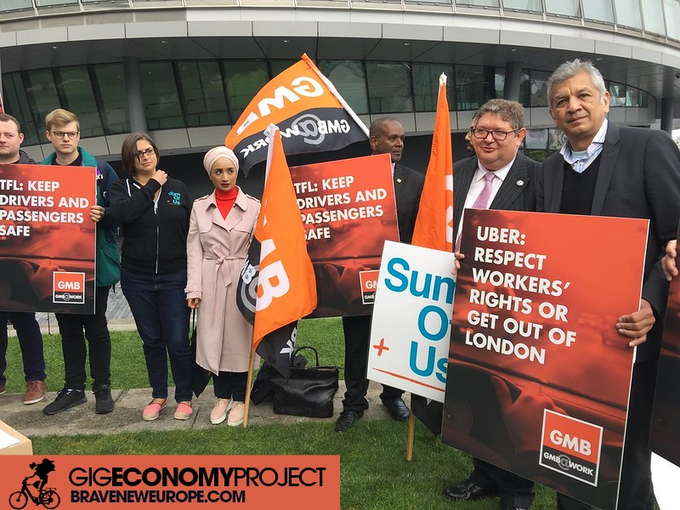The UK union GMB has signed a formal recognition agreement with ride-hail giant Uber, in what is a global first for the company, but grassroots unions which represent Uber drivers have questioned what exactly the union has won for the workers.
The Gig Economy Project, led by Ben Wray, was initiated by BRAVE NEW EUROPE enabling us to provide analysis, updates, ideas, and reports from all across Europe on the Gig Economy.
This series of articles concerning the Gig Economy in the EU was made possible thanks to the generous support of the Foundation Menschenwürde und Arbeitswelt


The agreement between tht GMB union and Uber has garnered worldwide attention as Uber had previously refused any formal relationship with unions representing Uber drivers. However, the announcement was short on details about what specifically will be on the collective bargaining negotiating table, with Jamie Heywood, Uber’s regional general manager for northern & eastern Europe, saying that the company will “consult in some areas, collectively bargain in others”.
The Financial Times has reported on the agreement that “Uber will not engage in collective bargaining over earnings, including the implementation of the minimum wage”. This is a critical issue because Uber has refused to comply with the ruling of the UK Supreme Court in February on working time. Lord Legatt had ruled that “time spent by the claimants working for Uber was not limited (as Uber argued) to periods when they were actually driving passengers to their destinations, but included any period when the driver was logged into the Uber app within the territory in which the driver was licensed to operate and was ready and willing to accept trips.”
If Uber were to comply with this ruling, it could increase the pay of Uber drivers by as much as 50%, such is the extent of unpaid working time most drivers currently experience waiting for passengers. Uber did accept the first ruling of Legatt, which was that Uber drivers are workers not self-employed, and therefore are entitled to workers’ rights like minimum wage, holiday pay, freedom from discrimination and whistleblower protection. Uber announced in March that drivers in the UK would now get an additional payment of 12.07% of earnings to reflect holiday pay, a pension scheme and a guarantee of the minimum wage from pick-up to drop-off, but not the whole time they are at work. Despite the announcement, the company has continued to face lawsuits from Uber drivers claiming unpaid wages due to the company’s lack of compliance with the working time element of the Supreme Court ruling.
The GMB, which part-funded the Supreme Court case against Uber, celebrated the victory in February, but it is unclear whether the union, which is one of the largest in the UK, is committed to the second part of Legatt’s ruling, that workers should be paid from log-in to log-out. In an article co-authored by Heywood and GMB national officer Mick Rix after the announcement of the recognition agreement, they stated that the deal “ensures every driver earns at least the National Living Wage for the time they are working on the app”.
The Gig Economy Project has put three questions to the GMB about the recognition agreement, but was yet to receive a response by time of publication. They are:
1) On earnings, does GMB support the UK Supreme court judgement that drivers should be paid from the moment they log-in, and if so will that be reflected in the union’s collective bargaining with Uber?
2) Will the union get any access to Uber’s algorithm during representations, such as in cases of account deactivations or on questions of driver surveillance?
3) What exactly is going to be collectively bargained in this agreement, and what is only subject to consultation?
In the GMB’s official statement on the agreement, the union says it will “work together” with Uber on areas like account deactivations, where GMB will “play a role representing drivers if they lose access to the Uber app.” On organising drivers, “Uber has agreed access rights for GMB representatives at driver hubs to enable them to meet and support drivers.” On representation, “GMB and Uber leadership will meet quarterly to discuss driver issues and concerns.”
Rix said the agreement “shows gig economy companies don’t have to be a wild west on the untamed frontier of employment rights.”
He added: “When tech private hire companies and unions work together like this, everyone benefits – bringing dignified, secure employment back to the world of work. We now call on all other operators to follow suit.”
Heywood commented: “Whilst Uber and GMB may not seem like obvious allies, we’ve always agreed that drivers must come first, and today we have struck this important deal to improve workers’ protections.
“Uber is the only major player in the industry to provide drivers with a national living wage guarantee, holiday pay and a pension, and this historic agreement means that Uber will be the first in the industry to ensure that its drivers also have full union representation.”
Commenting on the agreement, Nader Awaad, an Uber driver who is Chair of United Private Hire Drivers (UPHD), a branch of the grassroots union IWGB, said: “This recognition deal is a dud that signs away workers’ right to negotiate over pay and is a PR exercise for Uber. Unions should not sign deals which tie their hands behind their backs.
“Trade union recognition agreements at their best are only useful when backed up by workers and unions who are willing to fight fiercely for their rights. UPHD is the biggest union for Uber drivers in the UK and has been doing just this for years, organising strikes and protests with thousands of drivers taking part, and we will continue to do so until Uber sits down and listens to the concerns of their drivers.”
“Celebrating a deal that signs away workers rights sadly says a lot about the state of the trade union movement in Britain today. This is precisely why grassroots worker-led unions like UPHD have grown to represent more drivers than any of the older, larger unions: workers need a fighting alternative and are willing and able to build it.”
The App Drivers and Couriers Union (ADCU), another grassroots union which represents Uber drivers and were lead claimants in the Supreme Court victory against Uber in February, issued a statement on Wednesday [26 May] before the GMB-Uber deal was official, stating: “At this time ADCU is not prepared to enter into a recognition agreement with Uber. This is because Uber continues to violate basic employment law such as the right to minimum wage for all working time and holiday pay despite the recent UK Supreme Court ruling in our favour.
“Recently, Uber applied for declaratory relief from the High Court to confirm that its business model was not in violation of transport regulations despite commentary suggesting the opposite by Lord Leggatt in the Supreme Court ruling. We intend to intervene in this case to defend our members who have sought protection from the Supreme Court.
“We are disturbed by Uber’s divisive and anti-union behaviour in the United States, most recently in California and New York State, where Uber has used the appearance of blunt collective bargaining agreements to actually weaken the power of workers rather than the opposite. Naturally, we have concerns about Uber’s motivations on this side of the Atlantic not only in the UK but throughout Europe also.
“We are also concerned about Uber’s suggestion of preferential treatment of driver dismissal appeals. We believe that any such arrangement would be unlawful. We will continue to defend our members and hold Uber to account for all unfair dismissals and any adverse licensing action arising as a result.
“Overall, this is a step in the right direction, but there are significant obstacles in the way of ADCU reaching a similar agreement. For us, compliance with legal minimums should be the point of departure for any union agreement with Uber.”
Labour’s Shadow Employment Secretary Andy McDonald hailed the agreement, stating that it “shows the importance of trade unions in improving living standards, but there are still millions of workers who are without basic rights.”
He added: “Every worker deserves decent pay, security, dignity and rights at work. The government must change the law to ensure all gig economy workers receive full employment rights.”


Be the first to comment